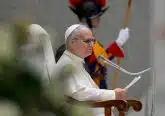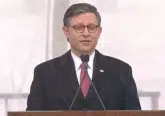Pope to COP30: ‘If you want to cultivate peace, care for creation’
By Linda Bordoni
Pope Leo XIV has urged world leaders gathered in Belém for the 30th United Nations Climate Change Conference (COP30) to make courageous and concrete commitments for the care of creation, reminding them that peace and environmental stewardship are inseparably linked.
Delivering the Pope’s message, Cardinal Pietro Parolin, Vatican Secretary of State, told delegates: “If you want to cultivate peace, care for creation.” The Pope’s words, he said, reflect the conviction that caring for our common home is both a moral duty and a path toward lasting peace.
Peace and creation are intertwined
In his message, the Pope noted that while global attention is often focused on wars and conflicts, peace is also gravely threatened “by a lack of due respect for creation, by the plundering of natural resources and by a progressive decline in the quality of life because of climate change.”
“These challenges endanger the lives of everyone on this planet,” he said, “and therefore require international cooperation and a cohesive and forward-looking multilateralism which puts the sacredness of life, the God-given dignity of every human being, and the common good at its centre.”
“In the midst of a world that is in flames, as a result of both global warming and armed conflicts, this Conference should become a sign of hope,” he said.
A moral responsibility
Recalling the words of Saint John Paul II, Pope Leo reiterated that the ecological crisis “is a moral issue” that demands a renewed sense of solidarity among nations.
“States must increasingly share responsibility, in complementary ways, for the promotion of a natural and social environment that is both peaceful and healthy,” he said.
He pointed out that the poorest and most vulnerable “are the first to suffer the devastating effects of climate change, deforestation, and pollution,” and stressed that caring for creation is therefore “an expression of humanity and solidarity.”
“We must turn words and reflections into choices and actions based on responsibility, justice, and equity,” he said.
From words to action
Looking back at the Paris Agreement of 2015, the Pope noted that “the path to achieving the goals set out in that Agreement remains long and complex.” He urged nations to “courageously accelerate the implementation of the Paris Agreement and the United Nations Framework Convention on Climate Change.”
Marking the tenth anniversary of Pope Francis’ encyclical Laudato si’, he reminded participants that “climate is a common good, belonging to all and meant for all.”
“May all participants in this COP30,” he added, “be inspired to embrace with courage this ecological conversion in thought and actions, bearing in mind the human face of the climate crisis.”
A new financial vision
Pope Leo went on to call for “a new human-centred international financial architecture” to ensure that all nations, especially “the poorest and those most vulnerable to climate disasters”, can achieve their potential and protect the dignity of their citizens.
Such a structure, he said, should also recognise “the link between ecological debt and foreign debt.”
He further appealed for “an education in integral ecology” that helps individuals and communities understand how daily choices – personal, family, and political – shape the future of humanity.
A commitment for the future
Concluding his message, the Pope urged participants “to protect and care for the creation entrusted to us by God in order to build a peaceful world.”
He assured all involved in COP30 of his prayers as they make important decisions for the common good and for the future of humankind, adding, “May this ecological conversion inspire the development of a new solidarity that safeguards creation and human dignity alike.”













